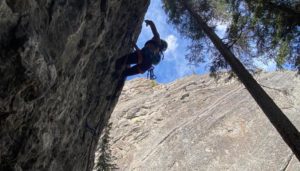That Time a Comp Climber Tested Positive for Cocaine
Edu Marin was banned from the IFSC for two years, but his sponsors continued to support him

In 2007 at the IFSC World Cup in Zurich, Spanish competitor Edu Marin tested positive for benzoylecgonine (cocaine). This is a prohibited substance under the World Anti Doping Agency Code.
Marin admitted to the wrongdoing and the IFSC imposed a sanction required by the Code for a first offence, which was a ban of two years. Marin was disqualified from the event.
In an interview with 8a.nu afterward, Marin apologized and said that he had taken the drug due to stress, not to boost his performance. “Maybe I should have approached climbing differently,” he said. “It’s hard to tolerate the training, so many hours in the climbing gym, always the same, a routine.”
Marin was then banned from all IFSC competitions from Aug. 1, 2007, to Aug. 1, 2009. The IFSC stated: “During this period, he cannot compete in or be involved in any competition organized or authorized by IFSC.” At the time, Marin was one of the most successful indoor and outdoors climbers, with repeats of routes like La Rambla 5.15a and Estado Critico 5.14d. His sponsors, Petzl and Boreal, stuck by him.
With the Olympics less than three weeks away, there will be more questions raised about athletes and performance enhancing drugs. Legendary climber John Long, a Stonemaster and member of the party that made the first one-day ascent of The Nose said in an interview with ClimbTalk Radio in 2010, that he tried steroids for six months out of curiosity after the end of his climbing career.
Long said, “But I’ll tell you one thing for sure, interesting, and that is, there’s a reason why those things are illegal. I discovered why, and it isn’t because they don’t work. I mean, you get strong as a freakin’ black bear on those things in no time. It is absolutely crazy how strong you get on those. And that was just doing a fairly moderate dose, nothing over the top, and I quit after one cycle.”
On July 2, Olympic runner Sha’Carri Richardson tested positive for THC and was banned from competing at the Tokyo Olympics. Richardson, 21, did not violate any codes, and said that after learning of her mother’s death and facing pressure to perform at trials, she used marijuana in Oregon, where it is fully legalized. The World Anti-Doping Agency lists THC as a substance of abuse alongside cocaine, heroin and MDMA/ecstasy.
In 1998, Canadian Ross Rebagliati won the first-ever gold at the Olympic snowboarding event. He lost his medal after testing positive for THC, but the Olympic committee later fave it back to him. For some history of the use of Marijuana in the world of climbing, including when Chris Sharma was disqualified from the X Games, see here.


